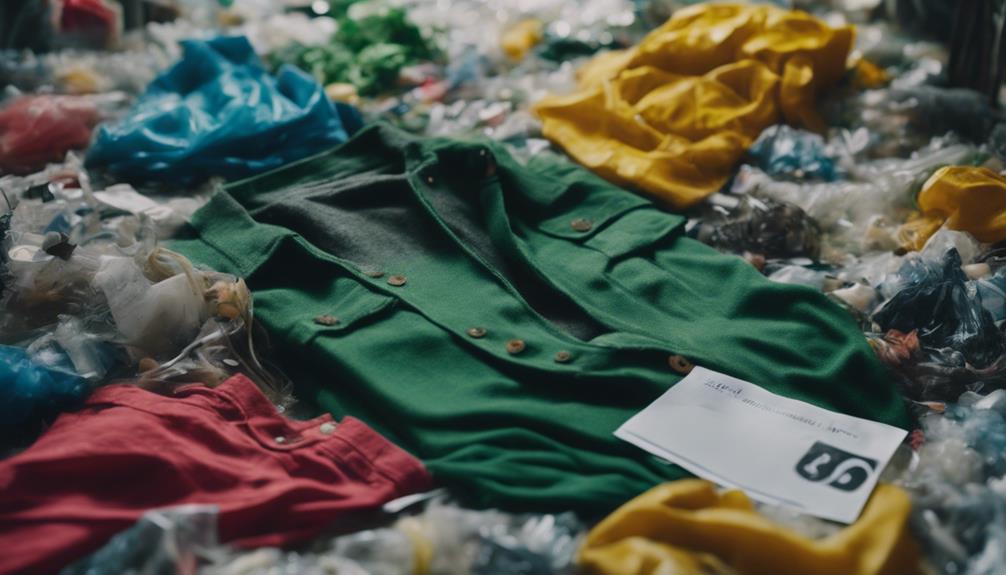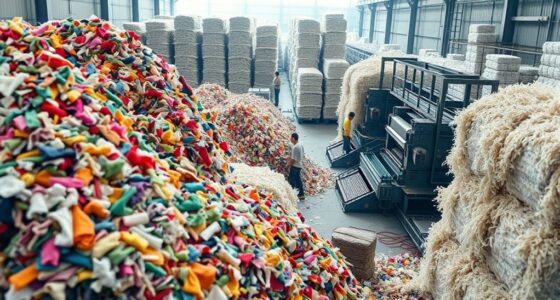Greenwashing has a serious impact on the sustainable fashion economy by distorting brands’ claims about their eco-friendliness. When companies employ misleading tactics, it can erode trust, making it difficult to distinguish truly sustainable options. With 60% of European brands’ sustainability claims found to be misleading, it can leave consumers confused about what is authentic. This lack of transparency fosters consumer skepticism and complicates making responsible choices. As awareness grows, the demand for accountability increases, pushing brands to actually improve their practices. Interested in learning how to identify genuine sustainability amidst marketing claims? Stay tuned to discover more insights.
Key Takeaways
- Greenwashing erodes consumer trust, making it difficult for shoppers to identify genuinely sustainable fashion brands.
- Misleading sustainability claims contribute to confusion, with nearly 39% of textile claims potentially being false or deceptive.
- Fast fashion's environmental impact, accounting for 2-8% of global carbon emissions, undermines efforts for a sustainable economy.
- Vague marketing and false certifications create a facade, complicating the transparency needed for true sustainability in fashion.
Understanding Greenwashing in Fashion
Understanding greenwashing in fashion reveals how misleading marketing tactics can distort the truth about sustainability claims made by brands. Greenwashing often involves brands touting their sustainability initiatives while masking their actual environmental impact.
For example, major players in the textile industry, like H&M, have faced backlash over vague claims and practices that don't align with true sustainable practices. You might be surprised to learn that the fast fashion model contributes considerably to global carbon emissions, accounting for 2-8% of the total.
Despite the push for sustainability, studies show that 60% of sustainability claims by European fashion brands are misleading. Brands often highlight recycled materials in specific products, ignoring the broader implications of their operations and the take-make-waste cycle. This tactic not only misleads consumers but also undermines genuine efforts toward sustainability, eroding consumer trust.
Additionally, the use of false certifications further complicates the landscape.
Impact on Consumer Trust
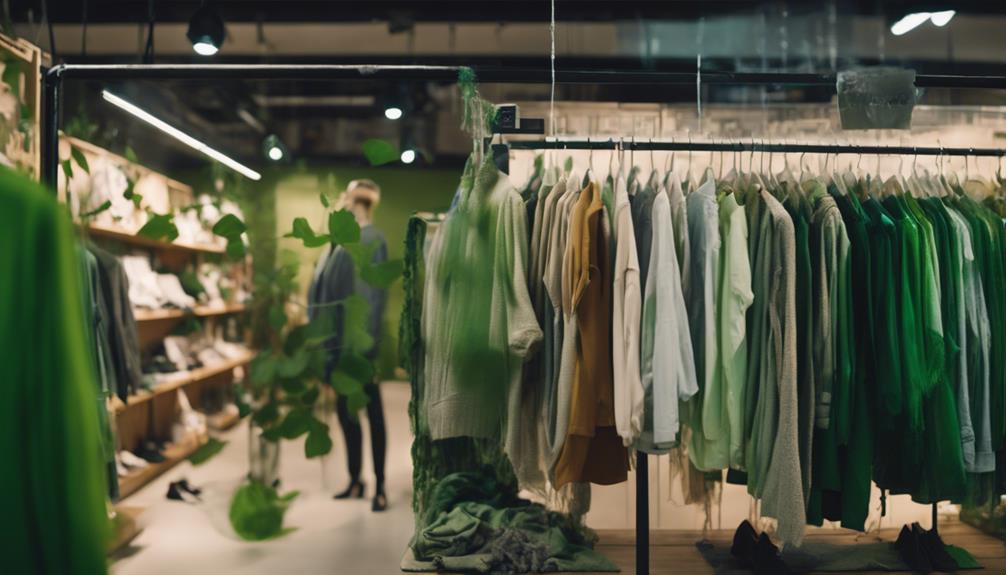
Eroding consumer trust due to greenwashing practices makes it increasingly challenging for shoppers to discern which brands genuinely prioritize sustainability. With an alarming 60% of fashion sustainability claims violating consumer protection guidelines, it's no wonder that you might feel confused by misleading labels. Fast fashion companies often exploit vague terminology, leaving you unsure about the authenticity of their eco-friendly products.
Research indicates that nearly 39% of sustainability claims in textiles could be false or deceptive, further contributing to market confusion. High-profile brands like H&M and Decathlon have faced backlash for misleading green claims, which not only tarnishes their reputations but also diminishes credibility across the entire industry. When you're seeking genuine sustainability, it's essential to recognize that vague marketing tactics can compromise consumer trust.
As awareness of greenwashing increases, you're likely to demand more transparency and accountability from brands. This shift in purchasing behavior emphasizes the importance of seeking out companies that provide clear, verified sustainability practices.
Ultimately, restoring consumer trust hinges on the fashion industry's commitment to honesty and clarity in its sustainability claims.
The Role of Global Initiatives
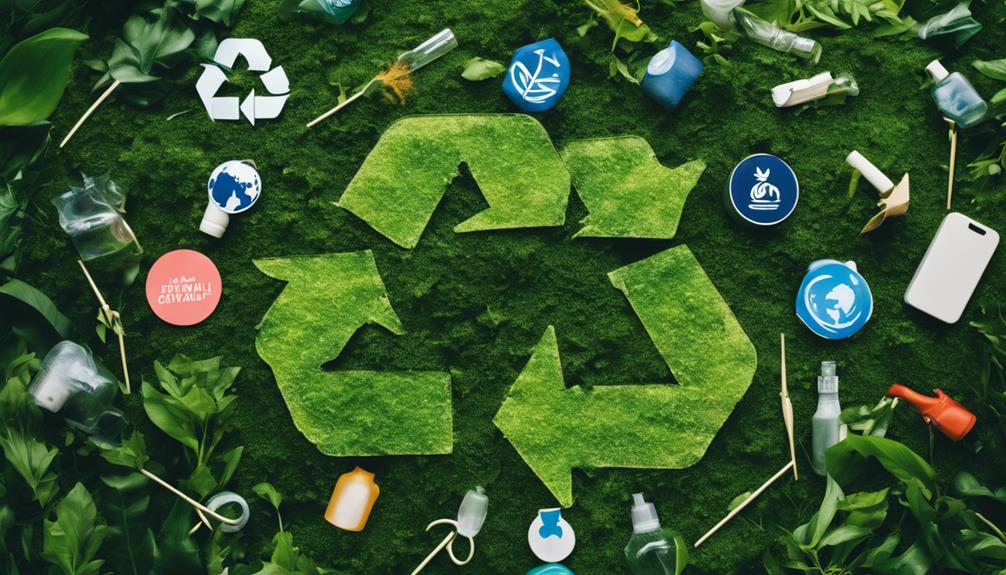
Global initiatives play an essential role in combating greenwashing in the fashion industry by establishing standards and frameworks that promote accountability and transparency in sustainability claims. By focusing on genuine climate action, these initiatives help create a more sustainable landscape for fashion businesses.
The UN's High-Level Expert Group aims to enhance accountability in corporate sustainability claims, making it harder for brands to mislead consumers.
Reports like 'Integrity Matters' provide recommendations that encourage both governments and businesses to resist greenwashing.
The UN Climate Change's Recognition and Accountability Framework holds companies accountable, reducing misleading marketing practices.
These global initiatives pave the way for a more responsible fashion industry by demanding transparency in sustainability efforts. By involving civil society, they guarantee that brands can no longer hide behind vague claims.
As a result, you can feel more confident in your purchasing decisions, knowing that these frameworks are working to mitigate the environmental impacts of the fashion sector.
The push for accountability not only combats greenwashing but also encourages brands to adopt genuine practices that align with sustainable values, ultimately fostering a healthier planet for future generations.
Identifying Greenwashing Tactics
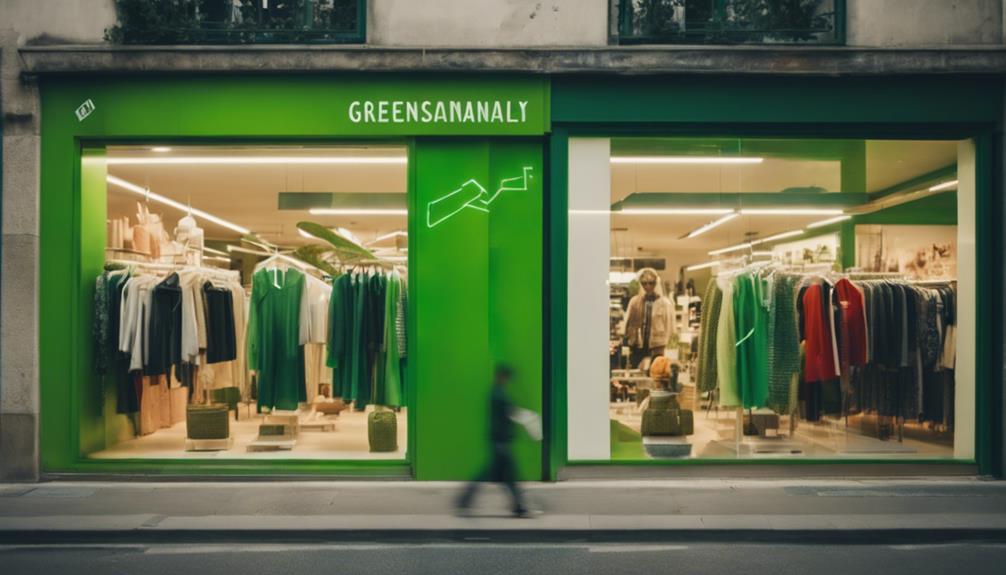
Many brands employ deceptive tactics to mask their unsustainable practices, making it essential for consumers to learn how to identify greenwashing. You might notice vague language in marketing that touts products as 'eco-friendly' without providing clear definitions or evidence. This can lead to confusion about a brand's actual sustainability claims. Be cautious of greenwashing brands that focus on a single sustainable product while ignoring the broader environmental degradation caused by their overall production methods.
Misleading labels and false certifications are common tactics used by brands like Zara and Primark, creating a façade of sustainability. A staggering 39% of sustainability claims in textiles may be false or deceptive, and 60% of assertions by European brands have been found inaccurate. These false claims undermine consumer trust and divert attention from harmful fast fashion practices.
To promote a circular economy, you should scrutinize any sustainability claims carefully and research the brands behind them. By being vigilant, you can help distinguish genuine efforts from greenwashing, ensuring that your choices contribute positively to a sustainable fashion economy.
Advocating for Genuine Sustainability

Advocating for genuine sustainability in fashion means actively challenging brands to prove their claims and supporting those that prioritize ethical practices. By doing this, you can help combat the pervasive issue of greenwashing that plagues the industry.
Demand transparency: Look for brands that openly share their environmental efforts and sourcing practices.
Seek third-party verification: Certifications like GOTS and Fair Trade can help you identify brands genuinely committed to sustainability.
Support responsible brands: Choose to invest in companies like Eileen Fisher and Reformation, which prioritize sustainable materials and ethical manufacturing.
As consumers, your choices matter. The fast fashion industry continues to produce around 100 billion garments annually, emphasizing the need for educated purchasing decisions.
By holding brands accountable, you contribute to a movement that pushes for genuine sustainability rather than misleading claims. Advocacy campaigns, such as those led by Greenpeace, are essential in mobilizing awareness and pushing for regulatory changes that address greenwashing.
When you prioritize genuine sustainability, you not only support responsible brands but also encourage the entire fashion industry to adopt more sustainable practices.
Frequently Asked Questions
How Does Greenwashing Affect Sustainability?
Greenwashing affects sustainability by misleading you into believing brands are eco-friendly. This confusion can make you skeptical, leading to poor choices and allowing companies to continue harmful practices while masking their true environmental impact.
Why Is Greenwashing Bad for the Fashion Industry?
Greenwashing's bad for the fashion industry because it misleads you into thinking brands are eco-friendly. This confusion erodes trust, making it harder to support genuinely sustainable options and ultimately harms the industry's credibility and future.
Why Is Greenwashing Bad for the Economy?
Greenwashing's harmful because it misleads you into believing brands are sustainable, distorting your choices. This confusion leads to poor purchasing decisions, stifles genuine eco-friendly brands, and ultimately harms the economy by perpetuating unsustainable practices.
Why Is Greenwashing Ethically Wrong?
Imagine being lured by a shimmering facade, only to find hollow promises beneath. Greenwashing's ethically wrong because it deceives you, distorts your choices, and drives genuine sustainability into shadows, leaving real change out of reach.
Are the Costs of Sustainable Fashion a Result of Greenwashing in the Industry?
Many consumers are questioning the expensive sustainable fashion numbers, suspecting them to be a result of greenwashing in the industry. It’s important for brands to transparently disclose their sustainable practices to build trust and credibility. Consumers deserve authentic and truly sustainable options without being misled by misleading marketing tactics.
Can Cider Fashion Contribute to the Issue of Greenwashing in Sustainable Fashion?
In a recent cider sustainable fashion article, the issue of greenwashing in the industry was raised. Many are concerned that cider fashion, while marketed as sustainable, may actually contribute to the problem due to lack of transparency and true commitment to eco-friendly practices. It’s important for consumers to be aware and informed.
Conclusion
In a world where sustainability is essential, greenwashing undermines genuine efforts for change.
When brands mislead you with false claims, it not only sows doubt but also hinders real progress toward a sustainable fashion economy.
Are you willing to let empty promises dictate your choices, or will you seek out brands that truly prioritize the planet?
By advocating for authentic sustainability, you can help reshape the fashion landscape into one that's transparent and responsible.
